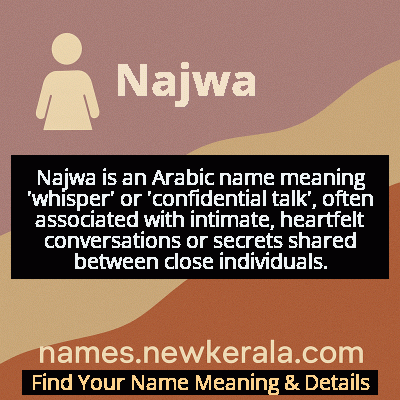Najwa Name Meaning & Details
Origin, Popularity, Numerology Analysis & Name Meaning of Najwa
Discover the origin, meaning, and cultural significance of the name NAJWA. Delve into its historical roots and explore the lasting impact it has had on communities and traditions.
Name
Najwa
Gender
Female
Origin
Muslim
Lucky Number
4
Meaning of the Name - Najwa
Najwa is an Arabic name meaning 'whisper' or 'confidential talk', often associated with intimate, heartfelt conversations or secrets shared between close individuals.
Najwa - Complete Numerology Analysis
Your Numerology Number
Based on Pythagorean Numerology System
Ruling Planet
Uranus (Rahu)
Positive Nature
Strong sense of order, loyal, practical, and disciplined.
Negative Traits
Stubborn, overly serious, rigid, and prone to feeling restricted.
Lucky Colours
Blue, gray.
Lucky Days
Saturday.
Lucky Stones
Blue sapphire.
Harmony Numbers
1, 7, 8.
Best Suited Professions
Managers, engineers, accountants, organizers.
What People Like About You
Dependability, discipline, practicality.
Famous People Named Najwa
Najwa Karam
Singer
Lebanese superstar known as 'The Sun of Lebanese Song' with over 30 albums and numerous awards
Najwa Zebian
Poet and Author
Lebanese-Canadian writer known for her bestselling poetry collections and advocacy for immigrant voices
Najwa Nimri
Actress and Singer
Spanish actress known for roles in 'Money Heist' and 'Vis a Vis', also a successful electronic music artist
Najwa Tannous
Journalist
Prominent Arab journalist and television presenter known for her political commentary and interviews
Name Variations & International Equivalents
Click on blue names to explore their detailed meanings. Gray names with will be available soon.
Cultural & Historical Significance
Throughout Islamic civilization, the name Najwa has been associated with women of wisdom, discretion, and spiritual depth. In many Muslim societies, naming a daughter Najwa expresses the parents' aspiration for her to develop strong moral character, maintain confidential relationships, and cultivate a deep spiritual life. The name carries centuries of cultural weight, representing the Islamic values of trust, confidentiality in relationships, and the sacred nature of personal communication. In contemporary times, while maintaining its traditional significance, the name has also become a symbol of cultural pride and identity for Muslims in diverse global contexts.
Extended Personality Analysis
Women named Najwa typically exhibit personality traits that beautifully reflect their name's meaning of 'confidential talk.' They are often characterized by exceptional emotional intelligence and natural discretion, making them trusted confidantes in both personal and professional settings. Their ability to listen deeply and maintain confidentiality often positions them as the emotional anchors in their relationships. Many Najwas demonstrate a unique combination of intuition and analytical thinking, allowing them to understand complex emotional landscapes and provide insightful guidance.
In social situations, Najwas tend to be observant and perceptive, often understanding situations and people on a deeper level than most. While they may not be the loudest voices in the room, their quiet wisdom and thoughtful contributions are highly valued. Their loyalty and reliability make them exceptional friends and partners, while their diplomatic nature enables them to navigate conflicts with grace and understanding. The name's association with confidential communication seems to manifest in their personality through a natural inclination toward meaningful, authentic interactions rather than superficial socializing. This depth of character, combined with their intuitive understanding of human nature, often leads Najwas to excel in fields requiring empathy, discretion, and interpersonal skills.
Modern Usage & Popularity
In modern times, Najwa continues to be a cherished name across the Muslim world and among diaspora communities, maintaining its traditional appeal while adapting to contemporary contexts. The name's usage has remained consistently popular rather than following dramatic trends, reflecting its status as a timeless classic. In countries with significant Muslim populations like Lebanon, Egypt, Morocco, and Malaysia, Najwa remains a familiar and respected choice. Among Western Muslim communities, the name has gained traction for its elegant sound, meaningful origin, and relative ease of pronunciation in multiple languages. The digital age has further popularized the name through prominent figures like Najwa Karam in music and Najwa Zebian in literature, making it more recognizable internationally. Current naming trends show that parents choosing Najwa often value both cultural heritage and the name's beautiful meaning, seeing it as a way to instill values of trust, communication, and spiritual connection in their daughters. The name's moderate popularity ensures it remains distinctive without being uncommon.
Symbolic & Spiritual Meanings
Symbolically, Najwa represents the sacred space of authentic communication and spiritual intimacy. The name embodies the metaphorical concept of the 'whispered secret' – that which is too precious or profound for public discourse and must be shared in confidence. It symbolizes the bridge between the human soul and divine consciousness, representing the private dialogues that shape our deepest beliefs and relationships. In a broader philosophical sense, Najwa represents the idea that truth often reveals itself in quiet moments of trust and that the most meaningful connections are forged through vulnerable, honest communication.
The name carries profound metaphorical significance as a representation of the inner sanctuary where masks are removed and authentic selves are revealed. It symbolizes the transformative power of being truly heard and understood, and the courage required to share one's truth. In many spiritual traditions, the concept paralleling 'najwa' represents the soul's direct communication with the divine, free from intermediaries and external influences. Thus, the name Najwa serves as a beautiful reminder of the sacred nature of confidential relationships, the power of authentic dialogue, and the spiritual depth that can be accessed through meaningful communication.

